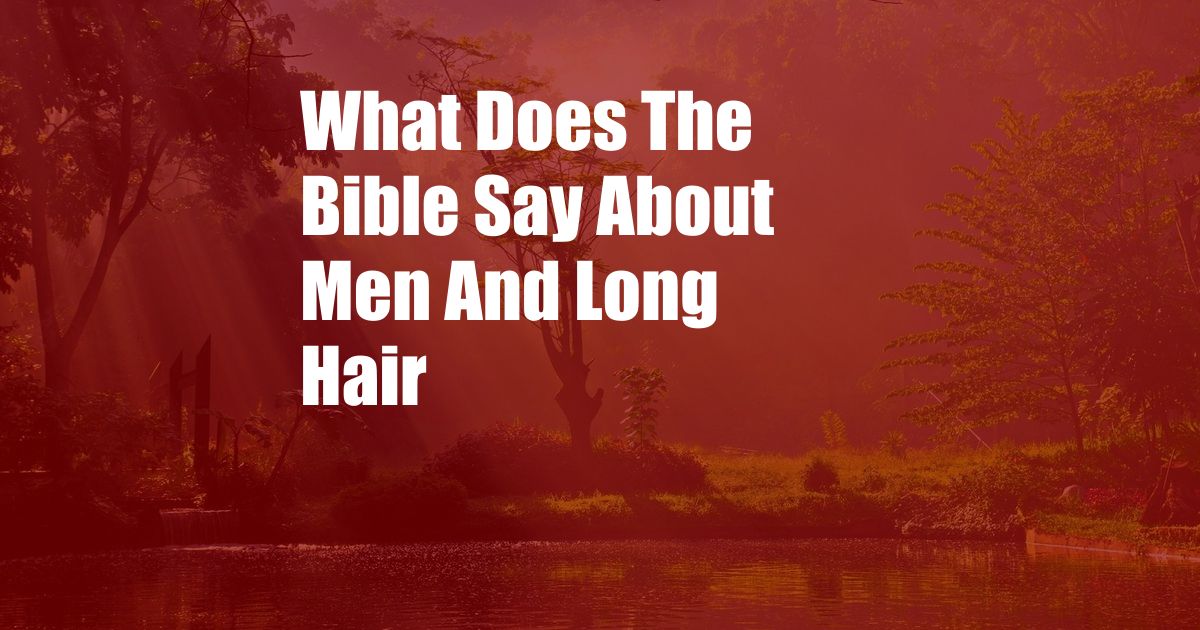
What the Bible Says About Men and Long Hair
In contemporary culture, men sporting long hair is fairly common, yet the topic has sparked debate and conjecture throughout history, particularly within religious contexts. The Bible, a revered text for Christians, offers insights on this matter, shaping perspectives and guiding beliefs among believers.
This article delves into the biblical perspective on men’s long hair, exploring the historical, cultural, and spiritual dimensions of this practice. By examining scriptural references, interpreting their context, and considering varying viewpoints, we aim to provide a comprehensive understanding of what the Bible has to say about this topic.
The Historical and Cultural Context
To fully grasp the biblical perspective on men’s long hair, it’s crucial to delve into the historical and cultural context in which these texts were written. In ancient times, long hair was often associated with effeminacy, weakness, and moral laxity. This societal view influenced how hair length was perceived and regulated within various cultures, including those mentioned in the Bible.
In the Greco-Roman world, short hair was considered a sign of virility and strength, while long hair was often associated with philosophers, poets, and individuals considered outsiders or rebels. This cultural context provides a backdrop for understanding the biblical passages that address men’s long hair.
Biblical References on Men’s Long Hair
The Bible contains several references to men’s long hair, both explicitly and implicitly. One notable example is found in the Old Testament book of Numbers, where the Nazarite vow is discussed.
“When either man or woman makes a special vow, the vow of a Nazirite, to separate themselves to the Lord, they shall abstain from wine and strong drink; they shall not drink vinegar made from wine or vinegar made from strong drink, nor shall they drink any grape juice or eat fresh grapes or raisins. All the days of their Nazirite vow they shall not eat anything that is produced by the grapevine, not even the seeds or the skins. All the days of their vow of Naziriteship, no razor shall touch their head. Until the time is completed for which they separate themselves to the Lord, they shall be holy; they shall let the locks of hair on their head grow long.”
(Numbers 6:2-5)
In this passage, the Nazarite vow involves, among other things, letting the hair grow long as a sign of dedication to God. This practice symbolized the individual’s separation from the world and their commitment to a higher calling.
Another biblical reference to men’s long hair is found in the New Testament letter of 1 Corinthians.
“Does not even nature itself teach you that if a man wears long hair, it is a disgrace to him, but if a woman has long hair, it is her glory? For her hair is given to her for a covering.”
(1 Corinthians 11:14-15)
In this passage, the apostle Paul argues that long hair is unnatural for men. He bases this view on the notion that God created man and woman with distinct roles and appearances. Paul suggests that long hair disrupts this natural order and brings dishonor to men.
Interpretation and Perspectives
The biblical references on men’s long hair have been interpreted in various ways throughout history. Some Christian denominations strictly adhere to the literal interpretation of these passages, teaching that men should avoid growing their hair long.
Others take a more contextual approach, considering the cultural and historical factors that influenced the biblical writers. They argue that the prohibitions against long hair should not be applied universally but rather understood within the specific cultural context in which they were written.
Modern Trends and Developments
In recent decades, societal attitudes towards men’s long hair have shifted significantly. Long hair is no longer universally associated with weakness or effeminacy. In many cultures, it has become a symbol of personal style and individuality.
This change in societal attitudes has also influenced the interpretation of the biblical passages on men’s long hair. Some Christian leaders now believe that these passages should be interpreted in light of modern cultural norms, allowing for greater flexibility in personal grooming practices.
Tips and Expert Advice
For Christian men considering growing their hair long, seeking guidance from trusted spiritual leaders and mentors is crucial. They can provide personalized insights and help individuals navigate the complexities of balancing biblical principles with personal preferences.
Additionally, it’s essential to consider the cultural and social context in which one lives. In some communities, long hair may be perceived negatively, while in others, it is more widely accepted. Sensitivity to cultural norms can help avoid unnecessary conflict or misunderstanding.
Frequently Asked Questions
Q: Is it a sin for men to have long hair?
A: The Bible does not explicitly state that it is a sin for men to have long hair. However, some Christian denominations interpret the passages discussed above as prohibiting men from growing their hair long.
Q: What does 1 Corinthians 11:14-15 mean in the context of men’s long hair?
A: In this passage, the apostle Paul argues that long hair is unnatural for men and may bring dishonor to them. However, some scholars suggest that Paul’s views should be understood within the cultural context of his time and may not apply universally.
Conclusion
The Bible offers diverse perspectives on men’s long hair. Interpreting these passages requires careful consideration of historical, cultural, and spiritual factors. Christian men seeking guidance on this matter should consult with trusted spiritual leaders, consider their cultural context, and ultimately make decisions based on their understanding of biblical principles and personal convictions.
Whether or not men should have long hair is a complex issue with no easy answer. Ultimately, each individual must discern the best course of action for themselves, guided by the Holy Spirit, biblical principles, and a desire to honor God.
Are you interested in learning more about the Bible’s teachings on men and long hair? Share your thoughts and questions in the comments below.